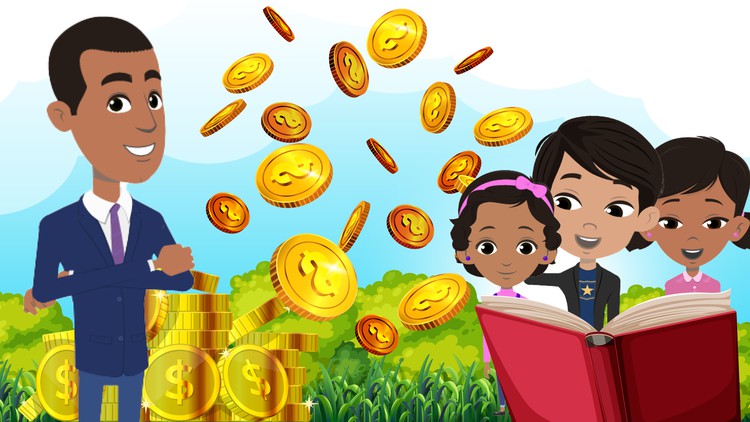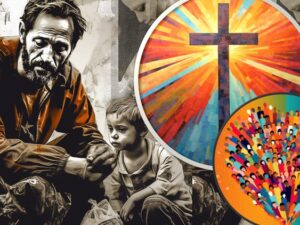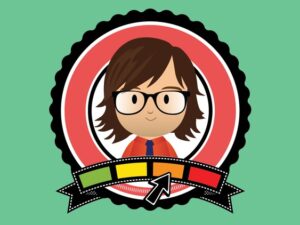The Complete Personal Finance for Kids and Teenagers Course
- Description
- Curriculum
- FAQ
- Reviews
- Grade

Whether you end up with a financially comfortable future or struggle endlessly with debt depends on only one thing: your financial literacy. Are you ready to take your personal finance knowledge to the next level while having fun? Do you want a teacher who explains complex finance, business, and economic concepts in an engaging and fun way? Do you wish you had been taught personal finance at an early age?
Then, this course is perfect for you!
In this course, you will learn in a fun, exciting, and engaging way. The course uses animated cartoon videos to help kids and teenagers intuitively understand everything they need to know about personal finance. Topics range from basic financial concepts to investing and saving for retirement.
Besides teaching essential topics that students would learn from any personal finance class, this course provides applicable real-life, practical business concepts that will help your kids start at an early age and become more successful in managing their personal finances.
This course aims to provide you with financial wisdom that’ll help you manage your money to create wealth and live a good life. You will learn many things that take place in the economy to make you smarter with your personal finance. The course is organized into six sections as follows:
-
Section 1: Personal Finance
-
Lecture 1. Invest In Yourself
-
Lecture 2. Financial Freedom
-
Lecture 3. The Three Little Pigs & Financial Planning
-
Lecture 4. How Should We Think About Money?
-
Lecture 5. Budgeting
-
-
Section 2. Understanding Money & The Economy
-
Lecture 6. Money vs. Currency
-
Lecture 7. What is Tax?
-
Lecture 8. The Role of Banks
-
Lecture 9. Interest Rates
-
Lecture 10. Inflation
-
-
Section 3: Understanding Debt
-
Lecture 11. What Is Debt?
-
Lecture 12. Bad Debt vs. Good Debt
-
Lecture 13. Student Loan
-
Lecture 14. What Is Bankruptcy?
-
-
Section 4: Saving For The Future
-
Lecture 15. Why Do People Save?
-
Lecture 16. Roth 401(K) vs. 401(K)
-
Lecture 17. Traditional IRA vs. Roth IRA
-
-
Section 5: Investment
-
Lecture 18. Parable of the Talents
-
Lecture 19. Risk vs. Reward
-
Lecture 20. Compounding Interest
-
Lecture 21. Stocks vs. Bonds
-
Lecture 22. Mutual Funds vs. Index Funds
-
Lecture 23. Diversification
-
-
Section 6: Financial Assistance & Tips
-
Lecture 24. Insurance
-
Lecture 25. How To Avoid Financial Scammers
-
Lecture 26. Give Back
-
DISCLAIMER: Please be aware that I am not a licensed financial advisor, and the information contained in this course should not be considered as professional financial advice. The content is presented strictly for educational purposes and represents my personal experiences and viewpoints on financial principles. It’s crucial for you to undertake your own research and seek advice from a certified financial professional prior to making any financial decisions.
-
2Invest In Yourself
If you want to be better than you are today, you must do something to improve yourself.
In this episode, you’ll learn what it means to “invest” in yourself and how to improve yourself every day.
Making the right decisions.
Making a sacrifice today so that we enjoy a greater benefit tomorrow
Making ourselves knowledgeable by reading books
Spending money on important or useful things
By helping others, we help ourselves and make the world a better place
Sleeping early helps us to rise early and do important stuff and improves our health
-
3Invest In Yourself Quiz
-
4Financial Freedom
In this episode, you’ll learn the following from Prof Stevy:
What “Financial Freedom” is
Benefits of having financial freedom
How to become financially free
-
5Financial Freedom Quiz
-
6The Three Little Pigs and Financial Planning
In this episode, you’ll learn the importance of financial planning from the well-known story of the three little pigs:
Things that can cause us to lose our financial freedom
The meaning of financial planning
How to plan your finances
The importance of financial planning
-
7The Three Little Pigs & Financial Planning Quiz
-
8How Should We Think About Money?
In this episode, you’ll learn how to think about money and relate to it. We will discuss the following questions:
What is “the psychology of money”?
Why are some people rich while others are poor?
Does our human nature affect how we think about money?
Is the economy fair to all people? Does everyone have the same opportunity?
Should all people be treated equally, whether they are rich or poor?
How do our personal experiences affect our financial decision-making?
Does being “lucky” control whether we become rich or poor?
How can financial literacy help us avoid being poor?
-
9How Should We Think About Money? Quiz
-
10Budgeting
In this episode, you’ll learn what a budget is and how you can use it to plan how you spend your money.
How can financial literacy and budgeting help us?
-
11Budgeting Quiz
-
12A Special Offer for Our Students
Special Offer
-
13Money vs. Currency
You probably already know what money is, but there are many fun facts about money I bet you've never heard!
In this episode, you will learn how money works, and whether you say “currency” instead of “money.”
It is not what you think!
Watch this episode to learn the following:
What is money?
How and why did people start to use money?
What is currency, and why do countries use different currencies?
-
14Money vs. Currency Quiz
-
15What is Tax?
In this episode, the characters time-travel to the ancient Roman empire to teach you about taxes.
Here is what you’ll learn:
What is tax?
Why do we pay taxes?
Who should pay taxes
How much tax should a person pay?
What are the benefits of paying taxes?
-
16What is Tax? Quiz
-
17The Role of Banks
Why do we have banks? One reason is to keep our money from danger, such as thieves or fire. However, banks play many other important roles in our lives, and after watching this episode, you will see just how important a bank is in any country!
Here are the things you’ll learn about banks in this episode:
What exactly is a bank?
How does a bank make profits after keeping our money safe for us?
How much money should a bank have?
Why do banks agree to lend the money it stores for some people to other people as loans?
-
18Quiz 8: The Role of Banks Quiz
-
19Interest Rates Quiz
In this episode, you will learn about interest and interest rates. This lesson will help you understand the following:
What interest is
What interest rate is
How the lender decides the interest amount
What happens when a person is unable to pay a loan
-
20Interest Rates Quiz
-
21Inflation
You probably have heard in the news that the economy is facing inflation, but perhaps you do not know what it means.
In this episode, you will learn about inflation, and why it is so important that economists always talk about it on TV.
Here is what you will learn:
Demand
Supply
The supply of money
Why prices change
Types of Inflation
Inflation versus deflation
What does the government do to lower the cost of goods
Why do the prices of goods change over time
Types of Inflation
Causes of different types of inflation
-
22Inflation Quiz
-
23What Is Debt?
Here is a saying you probably have heard many times: “Being in debt is a bad place to be.”
If you know what a “debt” is, you’ll quickly agree with that saying. But why is it bad to be in debt? What is a “debt” anyway?
In this episode, you will ’ll learn about debt, including the following:
What we mean by “debt”
What are a “lender” and a “borrower”
The rules to follow when taking and paying back debt
When is it okay to take a loan?
How to avoid being in debt
-
24What Is Debt Quiz
-
25Bad Debt vs. Good Debt
If you have already watched episode 12, you know what debt is. But do you know the difference between a “bad” debt and a “good” debt? If you have no idea, don’t worry! You are about to know!
In this episode, you will learn why a debt might be considered “bad” or “good.”
What we mean by “bad debt”
What we mean by “good debt”
How to manage bad debts
Bad debts we should avoid
-
26Bad Debt vs. Good Debt Quiz
-
27Student Loan
Who pays for college when students graduate from high school? If a student’s family can’t afford to pay for their student’s college expenses, what happens?
In this episode, you’ll learn how the government helps students to cope with the high cost of college education as we try to answer the following questions:
What is a student loan?
Repayment of a student loan
Interest rates for student loan
-
28Student Loan Quiz
-
29What Is Bankruptcy?
Just like ordinary people, businesses can go broke and lose their ability to conduct further business. Why does this happen, and what are the effects?
In this episode, you’ll learn about bankruptcy as we discuss the following:
The meaning of “bankruptcy”
What happens when a business is unable to fulfill its services and pay its debts
How the people it owes money will be repaid
Why a business may want to be declared bankrupt
Types of bankruptcies
-
30What Is Bankruptcy Quiz
-
31Why Do People Save?
Everybody knows that saving money is a good idea, but do you know why? Personal finance refers to the state of your financial stability. How does saving help improve your personal finance?
In this episode, you’ll learn the following:
Why people save money
Benefits of saving money
Ways of saving money
When to save money instead of spending it
-
32Why Do People Save Quiz
-
33Roth 401(K) vs. 401(K)
When people get older and retire, they will still need to pay their bills, even if they have left employment and do not have a monthly salary.
So, how do people survive during retirement?
In this episode, you’ll learn about retirement savings through a 401(k) and Roth 401(k).
The 401(k)
The Roth 401(k)
The difference between them
The benefits of choosing one over the other
-
34Roth 401(K) vs. 401(K) Quiz
-
35Traditional IRA vs. Roth IRA
If you have already watched the previous episode 16, you already have a good idea of retirement savings and 401(k) accounts.
But do you know about the Individual Retirement Accounts or IRA? Like the 401(k), we have a traditional and a Roth one.
In this episode, we’ll learn the following:
The Traditional IRA
The Roth IRA
The difference between them
Is one better than the other?
-
36Traditional IRA vs. Roth IRA Quiz
-
37Parable of the Talents
Parables are a great way to share knowledge through stories of events we can understand. Whatever religion you come from, this parable by Jesus Christ can teach us how to invest and create wealth.
In this lesson, you’ll see the universal truth behind the parable and use its wisdom to improve your personal finance skills. Here is what you’ll learn:
The parable of the talents
The unit of measurement called the “talent”
How to be a good manager of time
How to invest your time wisely
The importance of having a positive attitude
-
38Parable of the Talents Quiz
-
39Risk vs. Reward
For any action we take, there is always the chance that something could go wrong. An accident could happen at any time. But, how often in life do things go wrong?
In this episode, you’ll learn how to take chances wisely and weigh the risk of it going wrong. You’ll learn the following:
The nature of a risk
The likelihood of a risk occurring
The reward of taking a risk
How to prevent risks from occurring
How to reduce the negative effects of a risk if it occurs
-
40Risk vs. Reward Quiz
-
41Compounding Interest
There are different ways that interest on a loan or an investment can be calculated, such as the simple interest rate we learned about in the “Interest Rates” episode. Another type of interest is known as “Compounding interest.”
Albert Einstein, the great scientist, once said that compounding interest is the eighth wonder of the world. Why would such a great scientist say that?
In this episode, you’ll learn:
How compound interest works
How compound interest can make you super rich or super poor
Where is compound interest used
Advantages and disadvantages of compound interest
-
42Power of Compounding Interest Quiz
-
43Stocks vs. Bonds
Financial markets have many different types of investments you can make, and they all work differently.
In this episode, you’ll learn about bonds and stocks and their difference:
What a bond is
What a stock is
The difference between them
Whether one is better than the other
-
44Stocks vs. Bonds Quiz
-
45Mutual Funds vs. Index Funds
There are many strategies for ensuring profits in the financial markets, such as diversification, as we learned in episode 23. Mutual Funds and Index Funds are two other investment strategies.
In this episode, you’ll learn:
What a Mutual Fund is
What an Index Fund is
The difference between them
Whether one is better than the other
-
46Mutual Funds vs. Index Funds Quiz
-
47Diversification
The wise saying goes, “never put all your eggs in one basket.” But what does it really mean?
In this episode, you’ll learn of a strategy used by investors in the financial markets to protect themselves from losing all their money. Key points in this lesson are:
The meaning of the saying, “never put all your eggs in one basket”
Risks faced in a financial market
The meaning of diversification
Benefits of investing in different companies rather than one
Disadvantages of diversification in financial markets
-
48Diversification Quiz












